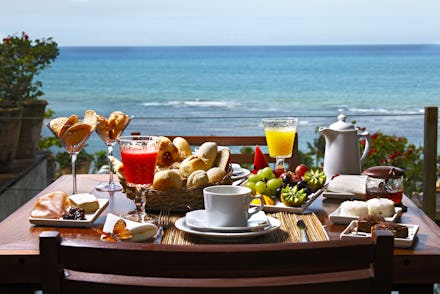Can’t stop eating on vacation? You’re not alone — and here’s why.

A croissant, a baguette smeared with honey and goat’s cheese, every last lick of a seven-course tasting menu and a speculoos-filled crepe purchased from a mustached street vendor. It was some of the best food I’d had in Paris — and it was just dinner on my first night. There’s something about being on vacation that throws any sense of restraint or routine out the window.
Beyond the addictive qualities of French food (it’s all about the butter), what is it that transforms travelers’ stomachs into bottomless pits when they’re away from home? As it turns out, there are several psychological and environmental factors that lead us to gorge ourselves on holiday.
The atmosphere factor
“Things tend to taste better on holiday,” Charles Spence, professor of experimental psychology and author of Gastrophysics: The New Science of Eating, said in a phone interview. When you enjoy the taste of something, you tend to eat more of it. Spence cited a phenomenon called the Provencal Rosé paradox, which refers to contextual factors that can influence the amount of pleasure a person feels when eating or drinking. “If you’re sitting on the beach somewhere with the warmth of the sun and the smell of the sea and the feel of the sand, those types of environmental cues affect how we taste things,” Spence said.
Atmospheric cues, or context, is everything, John S. Allen, anthropologist and author of The Omnivorous Mind: Our Evolving Relationship With Food previously told Mic. In our brains, the same croissant eaten in close proximity to the Louvre will taste better than when eaten while crammed in a New York City subway car.
Other contextual factors, like sound, can impact our perception of taste, resulting in eating more than we do at home. Research has found that loud music leads people to drink more — some restaurateurs have pumped the volume to increase sales and table turnover — and other sensory research has found that certain smells (think fresh-cut grass) are associated with more-delightful-than-usual eating experiences.
The social factor
On vacation, eating is a social activity — much different from the forkfuls of salad you scarf down in between meetings during the workday.
“It seems reasonable to suggest that we dine more with people on holiday than we do when we’re at home,” Spence said, noting that eating with company increases the quantity of food we consume. There are a couple of reasons for this: For one, when you’re engaged in conversation over dinner, you become less aware of your food, the tastes and flavors on your plate, and you tend to eat more of it because you’re distracted, Spence said. Because of this distraction, it takes longer for you to register feelings of fullness.
And even if you’re not particularly hungry, being in the presence of others eating may influence you to join in. It’s human nature to match the eating pace of those around us. “We’re simply trying to fit in and make a situation more comfortable,” Susan Albers, a clinical psychologist at the Cleveland Clinic and author of 50 Ways to Soothe Yourself Without Food told Health.
The indulgence factor
A vacation is, by definition, temporary. You’re away for a fixed amount of time, and eventually you must return to reality. Reality often equates to some semblance of routine.
“We’re less constrained, or more liberated, when we’re away from our normal environment,” Spence said. “We’re more willing to indulge.” Part of this is because we know there’s an end to this indulgence, meaning we don’t have to feel too guilty about throwing back more than a few piña coladas, because the “bad” habit isn’t going to last.
Another element here is that indulgence is often built in to our vacations. Research shows that the more food we see, the more food we end up eating, so breakfast buffets, dramatic dessert carts and all-inclusive trips where everyone around you is going ham on endless servings can entice you to join in on the fun.
All of this is to say it’s not your fault you’re so susceptible to eating everything in sight when you’re on holiday. So go ahead and break excessive amounts of bread with the rest of them — your food vacation can only last so long.